Related Research Articles

A Christmas carol is a carol on the theme of Christmas, traditionally sung at Christmas itself or during the surrounding Christmas holiday season. The term noel has sometimes been used, especially for carols of French origin. Christmas carols may be regarded as a subset of the broader category of Christmas music.

Christmas music comprises a variety of genres of music regularly performed or heard around the Christmas season. Music associated with Christmas may be purely instrumental, or, in the case of carols, may employ lyrics about the nativity of Jesus Christ, traditions such as gift-giving and merrymaking, cultural figures such as Santa Claus, or other topics. Many songs simply have a winter or seasonal theme, or have been adopted into the canon for other reasons.
A carol is a festive song, generally religious but not necessarily connected with Christian church worship, and sometimes accompanied by a dance. A caroller is someone who sings carols, and is said to be carolling.

Sir John Milford Rutter is an English composer, conductor, editor, arranger, and record producer, mainly of choral music.
"Ding Dong Merrily on High" is a Christmas carol. The tune first appeared as a secular dance tune known under the title "Branle de l'Official" in Orchésographie, a dance book written by the French cleric, composer and writer Thoinot Arbeau, pen name of Jehan Tabourot (1519–1593). The words are by the English composer George Ratcliffe Woodward (1848–1934), and the carol was first published in 1924 in his The Cambridge Carol-Book: Being Fifty-two Songs for Christmas, Easter, And Other Seasons. Woodward took an interest in church bell ringing, which no doubt aided him in writing it. Woodward was the author of several carol books, including Songs of Syon and The Cowley Carol Book. The macaronic style is characteristic of Woodward's delight in archaic poetry. Charles Wood harmonised the tune when it was published with Woodward's text in The Cambridge Carol Book. More recently, Sir David Willcocks made an arrangement for the second book of Carols for Choirs.
"Carol of the Bells" is a popular Christmas carol, which is based on the Ukrainian New Year's song "Shchedryk." The music for the carol comes from the song written by the Ukrainian composer Mykola Leontovych in 1914; the English-language lyrics were written in 1936 by Peter Wilhousky.

Gaudete is a sacred Christmas carol, thought to have been composed in the 16th century. It was published in Piae Cantiones, a collection of Finnish/Swedish sacred songs published in 1582. No music is given for the verses, but the standard tune comes from older liturgical books.*
"I Saw Three Ships (Come Sailing In)" is an English Christmas carol, listed as number 700 in the Roud Folk Song Index. The earliest printed version of "I Saw Three Ships" is from the 17th century, possibly Derbyshire, and was also published by William Sandys in 1833. The song was probably traditionally known as "As I Sat On a Sunny Bank", and was particularly popular in Cornwall.
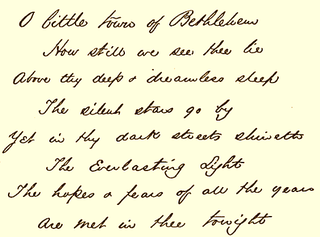
"O Little Town of Bethlehem" is a Christmas carol. Based on an 1868 text written by Phillips Brooks, the carol is popular on both sides of the Atlantic, but to different tunes: in the United States, to "St. Louis" by Brooks' collaborator, Lewis Redner; and in the United Kingdom, Canada, and Ireland to "Forest Green", a tune collected by Ralph Vaughan Williams and first published in the 1906 English Hymnal.

Will Vinton's Claymation Christmas Celebration is an animated Christmas television special originally broadcast on the American CBS TV network on December 21, 1987. The special featured stop motion clay animation and was produced and directed by Will Vinton. The special debuted alongside A Garfield Christmas and the two continued to be aired back to back in subsequent years.

Carols for Choirs is a collection of choral scores, predominantly of Christmas carols and hymns, first published in 1961 by Oxford University Press. It was edited by Sir David Willcocks and Reginald Jacques, and is a widely used source of carols in the British Anglican tradition and among British choral societies. A second volume was published in 1970, edited by David Willcocks and John Rutter, and the collection is now available in six volumes. A compendium edition was published later. In addition to music for Christmas, the collection also offers works that are suitable for other Christian festivals such as Advent and Epiphany.
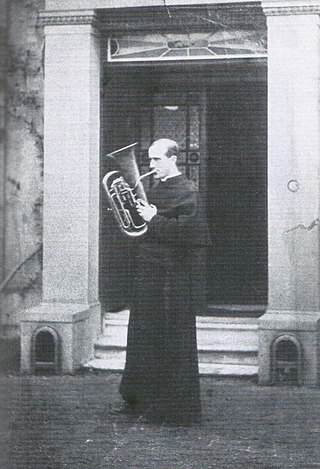
George Ratcliffe Woodward was an English Anglican priest who wrote mostly religious verse, both original and translated from ancient authors. The best-known of these were written to fit traditional melodies, mainly of the Renaissance. He sometimes harmonised these melodies himself, but usually left this to his frequent collaborator, composer Charles Wood.
The "Sans Day Carol", also known as "St. Day Carol", "The Holly Bears a Berry" and "The Holly Tree" is a traditional Cornish carol named after the Cornish village of St Day, where it was found around the turn of the twentieth century. Some sources give it as a Christmas carol, while other sources give it as a carol for the period between Passiontide and Easter. The song, which is listed as no. 35 in the Oxford Book of Carols, is very closely related to the more famous carol "The Holly and the Ivy". According to the Roud Folk Song Index, the "Sans Day Carol" and "The Holly and the Ivy" are variants of the same song.
Peace on Earth is the first Christmas album by American Christian rock band Casting Crowns. Produced by Mark Hall and Mark A. Miller, it was released on October 7, 2008. Intended by Hall to bring out the worshipful aspect of Christmas, the album does not have songs relating to secular Christmas traditions, instead featuring a mix of traditional Christmas carols and original songs. As co-producer, Hall attempted to differentiate the album from their previous ones by attempting to use creative ideas they had not tried before, and he also wanted to utilize the band's female members in a broader and more visible role on the album.
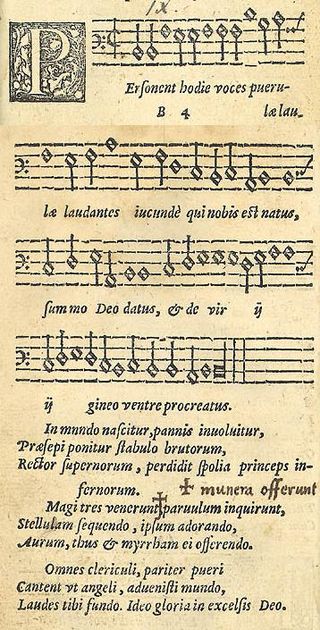
"Personent hodie" is a Christmas carol originally published in the 1582 Finnish song book Piae Cantiones, a volume of 74 Medieval songs with Latin texts collected by Jacobus Finno, a Swedish Lutheran cleric, and published by T.P. Rutha. The song book had its origins in the libraries of cathedral song schools, whose repertory had strong links with medieval Prague, where clerical students from Finland and Sweden had studied for generations. A melody found in a 1360 manuscript from the nearby Bavarian city of Moosburg in Germany is highly similar, and it is from this manuscript that the song is usually dated.
Heathcote Dicken Statham CBE was a conductor, composer and organist of international repute.
Alan Bullard is a British composer, known mainly for his choral and educational music. His compositions are regularly performed and broadcast worldwide, and they appear on a number of CDs.
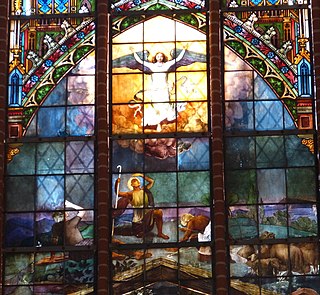
Angels' Carol is a popular sacred choral piece by John Rutter for Christmas. He wrote his own text, beginning "Have you heard the sound of the angel voices", three stanzas with the refrain "Gloria in excelsis Deo". It has been part of recordings of collections of Christmas music, including one conducted by the composer.

Patric Standford was an English composer, supporter of composers' rights, educationalist and author.
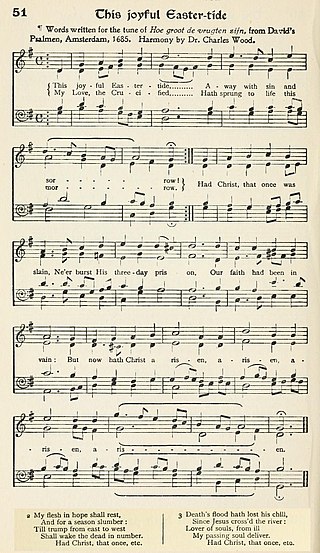
"This joyful Eastertide" is an 1894 Easter carol. The words are by George Ratcliffe Woodward, the tune is from the Netherlands (1624), and the 1894 harmonisation is by Charles Wood.
References
- ↑ "Waits". Encyclopædia Britannica (11th ed.). 1911.
- 1 2 "Past Three O'Clock". Hymns and Carols of Christmas. Retrieved 24 January 2021.
- ↑ London: Society for Promoting Christian Knowledge.
- ↑ Novello and Co Ltd.
- ↑ EMI: CDM 7 69950 2
- ↑ Once As I Remember... Philips: 462050
- ↑ James Galway's Christmas Carol at allmusic.com
- ↑ "A Christmas Carol Symphony". Patric Standford homepage. Retrieved 24 January 2021.